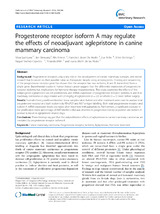Progesterone receptor isoform A may regulate the effects of neoadjuvant aglepristone in canine mammary carcinoma
Autor
Guil-Luna, Silvia
Stenvang, Jan
Brünner, Nils
De Andrés, Francisco Javier
Sánchez Céspedes, Raquel
Millán, Yolanda
Martín de las Mulas González-Albo, Juana
Editor
BioMed CentralFecha
2014Materia
Canine mammary carcinomaProgesterone receptor
Isoforms
Aglepristone
Hormone treatment
METS:
Mostrar el registro METSPREMIS:
Mostrar el registro PREMISMetadatos
Mostrar el registro completo del ítemResumen
Background: Progesterone receptors play a key role in the development of canine mammary tumours, and recent
research has focussed on their possible value as therapeutic targets using antiprogestins. Cloning and sequencing
of the progesterone receptor gene has shown that the receptor has two isoforms, A and B, transcribed from a
single gene. Experimental studies in human breast cancer suggest that the differential expression of progesterone
receptor isoforms has implications for hormone therapy responsiveness. This study examined the effects of the
antiprogestin aglepristone on cell proliferation and mRNA expression of progesterone receptor isoforms A and B in
mammary carcinomas in dogs treated with 20 mg/Kg of aglepristone (n = 22) or vehicle (n = 5) twice before surgery.
Results: Formalin-fixed, paraffin-embedded tissue samples taken before and after treatment were used to analyse total
progesterone receptor and both isoforms by RT-qPCR and Ki67 antigen labelling. Both total progesterone receptor and
isoform A mRNA expression levels decreased after treatment with aglepristone. Furthermore, a significant decrease in
the proliferation index (percentage of Ki67-labelled cells) was observed in progesterone-receptor positive and isoform-A
positive tumours in aglepristone-treated dogs.
Conclusions: These findings suggest that the antiproliferative effects of aglepristone in canine mammary carcinomas are
mediated by progesterone receptor isoform A.

